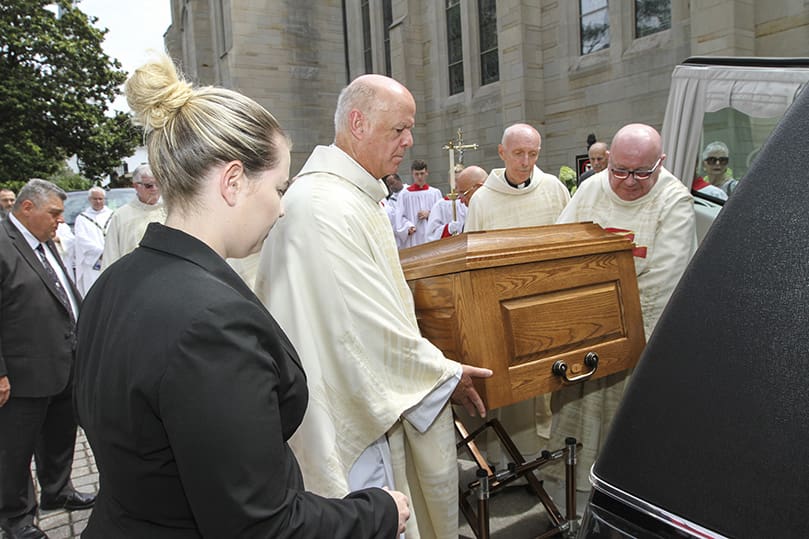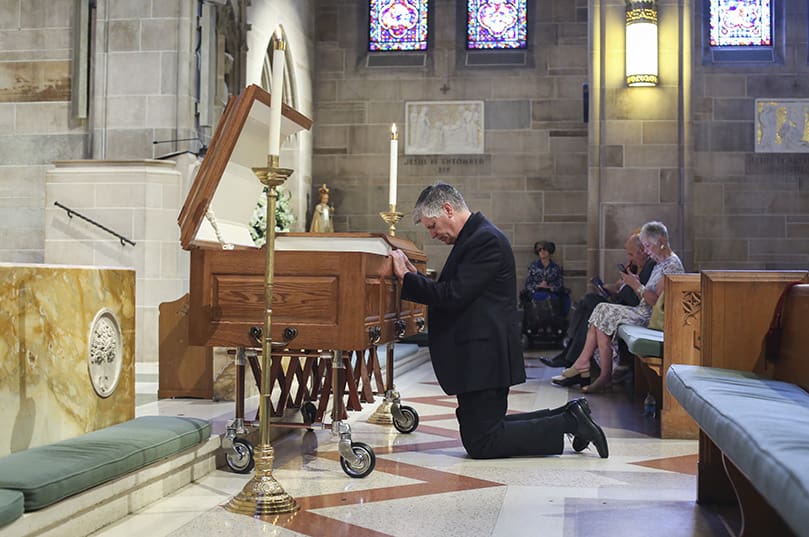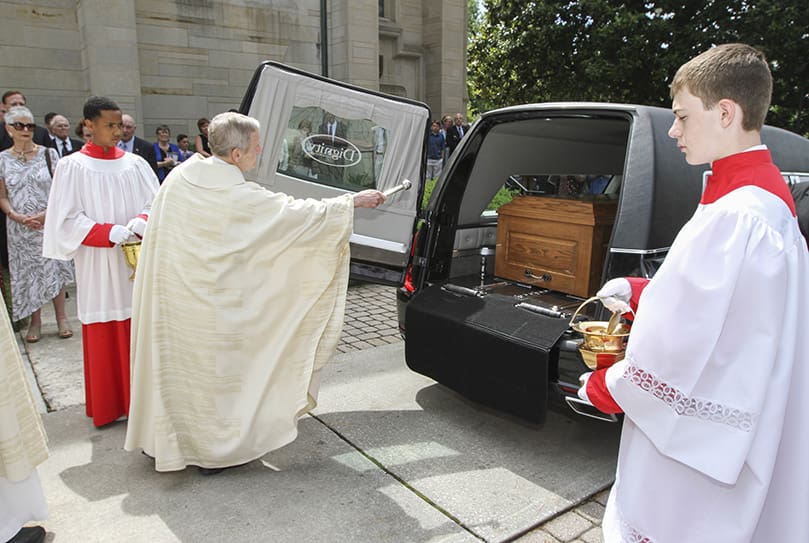Elana Ray, a funeral director for H.M. Patterson & Son - Spring Hill Chapel, Atlanta, looks on as three of the six pall bearers (clockwise, from left), Msgr. Peter Rau, pastor of St. Peter Chanel Church, senior priest Father John Adamski and Msgr. Francis McNamee, rector of the Cathedral of Christ the King, Atlanta, place Father Richard Morrow’s casket in the funeral hearse. Photo By Michael Alexander
Atlanta
Love and devotion of Father Richard Morrow remembered
By ANDREW NELSON, Staff Writer | Published June 27, 2019
ATLANTA—For two days men and women filled the Cathedral of Christ the King to say farewell to Father Richard Morrow, the longest-serving priest in the Archdiocese of Atlanta.
At his funeral Tuesday, June 25, the tall, lanky priest who faced the Ku Klux Klan and hosted the Kennedys was remembered for his love of ministry, whether starting a church community, visiting the sick at their hospital bed, or stopping by a home.
Father Morrow’s 64 years as a priest were “a constant and enthusiastic response” to Jesus and his invitation to serve others, said Archbishop Emeritus Eusebius J. Beltran, of Oklahoma City. He met Father Morrow when both were seminarians serving at a Savannah summer camp in the mid-1950s.
“Like the good shepherd he was, Father Morrow reached out to everyone. His many years of priestly service were filled with love and devotion,” said Archbishop Beltran.
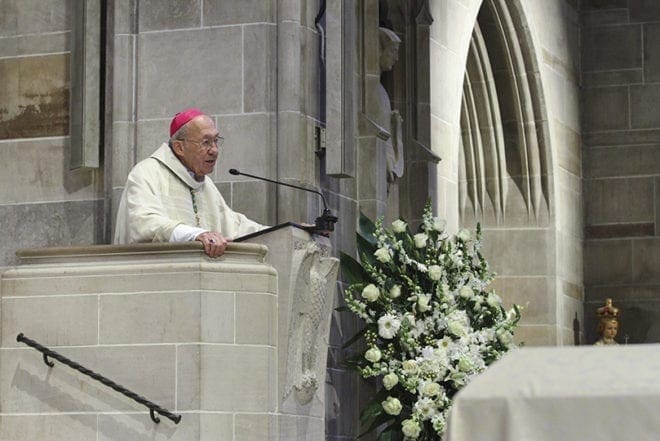
During his homily, Archbishop Eusebius J. Beltran, archbishop emeritus of the Archdiocese of Oklahoma City, shares some thoughts about his confidant and brother priest, Father Richard Morrow. The two became friends as seminarians when they worked together in the Savannah-Atlanta Diocese in the 1950s. Photo By Michael Alexander
He highlighted his friend’s practice of visiting believers in their home. It wasn’t just a nice thing to do, rather it offered a profound encounter with God. Father Morrow’s ministry “brought Jesus to people and people to Jesus,” said Archbishop Beltran.
“This visitation in homes and hospitals was friendly, but not just friendly; social, but not just social; it was fundamentally pastoral and sacramental. In his visit, Father Morrow invited people to avail themselves of the sacrament of penance; he anointed the sick and the elderly and afforded people the opportunity to receive holy Communion.”
Believers paid their final respects at the Peachtree Road cathedral. Also attending were his brother, Neil, and his sister-in-law, Marianna, of Wilmington, North Carolina, and many members of his extended family.
Auxiliary Bishop Bernard E. Shlesinger III celebrated the funeral Mass at the mother church of the Atlanta Archdiocese, along with scores of priests, assisted by several deacons.
Father Morrow after his death is now “loving us, praying for us, exercising his ministry of charity,” said Bishop Shlesinger.
A final blessing
After the service, the priests in their white vestments crowded around his wooden casket as it was loaded into the hearse and chanted the prayer “Salve Regina” and then each blessed the casket with holy water.
Father Morrow, 89, died Saturday, June 15. He was born in Stamford, Connecticut, on Aug. 9, 1929 to Joseph and Kathleen Morrow. He earned a bachelor’s degree at St. Bernard Seminary in Rochester, New York, studying two years of philosophy and four years of theology. By his telling, he parents were skeptical he’d stay in seminary because he was a bit of a brat growing up.
He wanted to move to Georgia to serve where there was a need for Catholic priests. At one time, one diocese covered the entire state. He arrived in 1955 and was one of some 40 diocesan priests in Georgia, where he lived for the rest of his life. Today, there are close to 200 priests serving in the archdiocese.
As a pastor in seven parishes, Father Morrow’s joy was his outreach to people, said Father Steven Yander. Father Yander spoke about his friend at a service on Monday, June 24.
Father Yander said Father Morrow simply loved being a priest, being with people in their time of need and time of celebration.
“I don’t know another priest who was so enthusiastic about the priesthood. He’d say, ‘Aren’t we lucky (to be priests)?’”
People paid their respects to Father Morrow with special touches to recognize the ways they knew him. More than 20 men and women, who visit the sick like he did, wore their hospital badges as a sign of remembrance.
In April 2004, Maria MacConnie was a frightened hospital patient at Piedmont Atlanta Hospital hearing news of a serious heart condition. Heavy on the mind of the retired Delta employee was her hope to be reconciled with the church. For some 25 years she attended Mass, but did not receive communion.
Father Morrow on that day was making his hospital rounds when her husband, Bruce, flagged him down. With his ministry, he was about to hear a story of sadness and fear.
“Let’s talk about it,” MacConnie remembered him saying.
With MacConnie in the recovery room, Father Morrow heard her confession and offered absolution, she said. MacConnie received communion for the first time in a quarter of century.
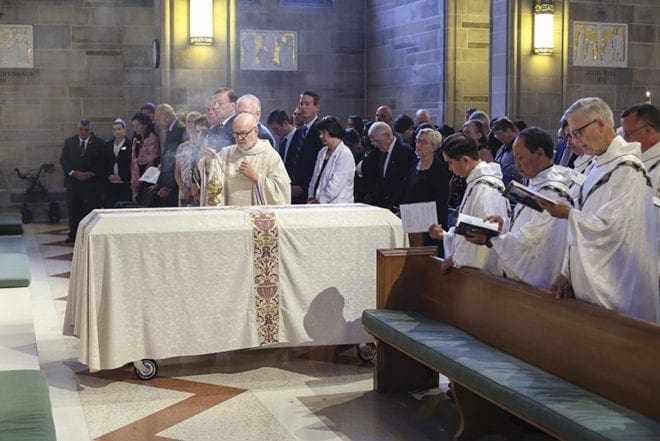
Senior priest Father Steven Yander censes the casket of Father Richard Morrow during the final commendation. The 89-year-old Father Morrow, a priest for nearly 65 years, died June 15. Photo By Michael Alexander
“It absolutely strengthened my faith. I think Jesus Christ sent Father Morrow to me. It changed my whole life. I was full of joy. Father Morrow relieved me of the burden I carried on my heart.”
MacConnie attends Holy Trinity Church, Peachtree City, where she is a leader in a rosary prayer ministry and many others.
“I’m just so thankful to him for taking the opportunity to counsel me and listen to me,” she said.
Setting an example of outreach
“He had a zest for life and ministry. That rubbed off on me,” said Sister Kathleen Lyons.
Sister Kathleen then in her mid-20s had just made her final vows as a member of the Sisters of Mercy. After a year in the classroom at St. John the Evangelist School, she was hired to be the parish director of religious education, part of Father Morrow’s parish staff. He served there from 1972 to 1978.
Father Morrow drew the best out of people, she said, speaking from Philadelphia where she now lives. It was an exciting, happy time, she said. “He recognized all the talent in the staff. We were able to share that talent,” she said.
Sister Kathleen said the time in Hapeville with Father Morrow set the mold for how she lived her life with outreach and service as a sister.
Father Morrow’s first assignment in 1955 was as a parochial vicar at Our Lady of the Assumption Church, Atlanta. During that time he also served as chaplain to the Department of Veterans Affairs Medical Center. Good Shepherd Church in Cumming was Father Morrow’s last full-time pastorate in 1996. He also served at churches in Smyrna, Cedartown and Buford.
He drew the attention of the Klan when he protested Atlanta bus segregation. In 1964, the Klan again marched when Father Morrow hosted Robert F. Kennedy and his wife, Ethel, as the former attorney general dedicated a chapel at the University of West Georgia named for his slain brother, President John F. Kennedy.
He retired in 1997, but remained celebrating Mass and the sacraments for the Catholic community. For the past 22 years, he lived among the priests at the Cathedral of Christ the King, Atlanta.
He was buried at Arlington Memorial Park in Sandy Springs following the Mass.
